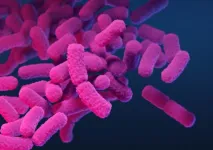(Press-News.org) The oldest fossilised forest known on Earth – dating from 390 million years ago – has been found in the high sandstone cliffs along the Devon and Somerset coast of South West England.
The fossils, discovered and identified by researchers from the Universities of Cambridge and Cardiff, are the oldest fossilised trees ever found in Britain, and the oldest known fossil forest on Earth. This fossil forest is roughly four million years older than the previous record holder, which was found in New York State.
The fossils were found near Minehead, on the south bank of the Bristol Channel, near what is now a Butlin’s holiday camp. The fossilised trees, known as Calamophyton, at first glance resemble palm trees, but they were a ‘prototype’ of the kinds of trees we are familiar with today. Rather than solid wood, their trunks were thin and hollow in the centre. They also lacked leaves, and their branches were covered in hundreds of twig-like structures.
These trees were also much shorter than their descendants: the largest were between two and four metres tall. As the trees grew, they shed their branches, dropping lots of vegetation litter, which supported invertebrates on the forest floor.
Scientists had previously assumed this stretch of the English coast did not contain significant plant fossils, but this particular fossil find, in addition to its age, also shows how early trees helped shape landscapes and stabilise riverbanks and coastlines hundreds of millions of years ago. The results are reported in the Journal of the Geological Society.
The forest dates to the Devonian Period, between 419 million and 358 million years ago, when life started its first big expansion onto land: by the end of the period, the first seed-bearing plants appeared and the earliest land animals, mostly arthropods, were well-established.
“The Devonian period fundamentally changed life on Earth,” said Professor Neil Davies from Cambridge’s Department of Earth Sciences, the study’s first author. “It also changed how water and land interacted with each other, since trees and other plants helped stabilise sediment through their root systems, but little is known about the very earliest forests.”
The fossil forest identified by the researchers was found in the Hangman Sandstone Formation, along the north Devon and west Somerset coasts. During the Devonian period, this region was not attached to the rest of England, but instead lay further south, connected to parts of Germany and Belgium, where similar Devonian fossils have been found.
“When I first saw pictures of the tree trunks I immediately knew what they were, based on 30 years of studying this type of tree worldwide” said co-author Dr Christopher Berry from Cardiff’s School of Earth and Environmental Sciences. “It was amazing to see them so near to home. But the most revealing insight comes from seeing, for the first time, these trees in the positions where they grew. It is our first opportunity to look directly at the ecology of this earliest type of forest, to interpret the environment in which Calamophyton trees were growing, and to evaluate their impact on the sedimentary system.”
The fieldwork was undertaken along the highest sea-cliffs in England, some of which are only accessible by boat, and revealed that this sandstone formation is in fact rich with plant fossil material from the Devonian period. The researchers identified fossilised plants and plant debris, fossilised tree logs, traces of roots and sedimentary structures, preserved within the sandstone. During the Devonian, the site was a semi-arid plain, criss-crossed by small river channels spilling out from mountains to the northwest.
“This was a pretty weird forest – not like any forest you would see today,” said Davies. “There wasn’t any undergrowth to speak of and grass hadn’t yet appeared, but there were lots of twigs dropped by these densely-packed trees, which had a big effect on the landscape.”
This period marked the first time that tightly-packed plants were able to grow on land, and the sheer abundance of debris shed by the Calamophyton trees built up within layers of sediment. The sediment affected the way that the rivers flowed across the landscape, the first time that the course of rivers could be affected in this way.
“The evidence contained in these fossils preserves a key stage in Earth’s development, when rivers started to operate in a fundamentally different way than they had before, becoming the great erosive force they are today,” said Davies. “People sometimes think that British rocks have been looked at enough, but this shows that revisiting them can yield important new discoveries.”
The research was supported in part by the Natural Environment Research Council (NERC), part of UK Research and Innovation (UKRI). Neil Davies is a Fellow of Churchill College, Cambridge.
END
Earth’s earliest forest revealed in Somerset fossils
2024-03-07
ELSE PRESS RELEASES FROM THIS DATE:
European Lung Cancer Congress 2024
2024-03-07
Lugano, Switzerland, 07 March 2024 – The European Lung Cancer Congress 2024 is the annual appointment that brings together various experts in the field of thoracic oncology, including thoracic surgeons, respiratory physicians and pneumologists, medical and radiation oncologists, interventional radiologists and pathologists, to discuss the latest insights into the recent developments in the prevention, diagnosis and treatment of lung cancer.
The event will take place in Prague, Czech Republic, and through a dedicated ...
Pinging pipes could help to identify lead water lines without excavation
2024-03-07
As any percussionist or fidgety pen-tapper can tell you, different materials make different noises when you hit them. Researchers at Drexel University hope this foundational acoustic phenomenon could be the key to the speedy removal of lead water lines that have been poisoning water supplies throughout the country for decades. A recent study conducted with geotechnical engineering consultant Seaflower Consulting Services, showed that it is possible to discern a buried pipe’s composition by striking ...
A new manganese-fluorine catalyst with exceptional oxidizing power
2024-03-07
A research team, affiliated with UNIST has unveiled a cutting-edge catalyst with exceptional oxidizing power, capable of extracting electrons from compounds. Anticipated to revolutionize various fields, including the development of metal catalysts and synthetic chemistry, this catalyst marks a significant breakthrough in catalytic research.
Led by Professor Jaeheung Cho in the Department of Chemistry at UNIST, the research team successfully synthesized the pioneering manganese-fluorine catalyst, utilizing the Macrocyclic Pyridinophane System. This catalyst demonstrates the ability to induce oxidation reactions, ...
An aspirin a day? Poll of older adults suggests some who take it may be following outdated advice
2024-03-07
One in four older adults take aspirin at least three times a week, mostly in hopes of preventing heart attacks and strokes, a new poll shows.
But many people aged 50 to 80 who said they take aspirin may not need to, the findings from the University of Michigan National Poll on Healthy Aging suggest.
In all, 57% of people aged 50 to 80 who say they take aspirin regularly also said they don’t have a history of cardiovascular disease. Such people should have a conversation with their health care provider about what’s best for them before stopping or starting aspirin use.
National guidelines have changed in recent years for using aspirin for prevention, ...
What makes a pathogen antibiotic-resistant?
2024-03-07
Antimicrobial resistance is a story of constantly moving parts and players. With every new or tweaked antibiotic or antimicrobial drug, the targeted pathogens begin the evolutionary dance of acquiring resistance, prompting researchers to constantly develop workarounds or entirely new classes of medicine.
Understanding the underlying mechanisms of acquired antimicrobial resistance is critical to the fight, a case of knowing one’s enemy. In a new paper published March 2, 2024 in npj Antimicrobials and Resistance, part of the Nature Portfolio, researchers at Sanford Burnham Prebys, working with Roche Pharma Research and Early Development, ...
Method rapidly verifies that a robot will avoid collisions
2024-03-07
Before a robot can grab dishes off a shelf to set the table, it must ensure its gripper and arm won’t crash into anything and potentially shatter the fine china. As part of its motion planning process, a robot typically runs “safety check” algorithms that verify its trajectory is collision-free.
However, sometimes these algorithms generate false positives, claiming a trajectory is safe when the robot would actually collide with something. Other methods that can avoid false positives are typically too slow for robots in the real world.
Now, MIT researchers have developed a safety check technique which can prove with 100 percent accuracy ...
Eating habits, physical activity practice and clinical prognosis of colorectal cancer patients with overweight/obesity
2024-03-07
Background and objectives
Obesity is a chronic metabolic disease associated with the development of several other diseases, including cancer. The present study aims to evaluate the eating habits, physical activity, and clinical profiles of colorectal cancer (CRC) patients with overweight/obesity.
Methods
A cross-sectional study was conducted with data collected from the medical records of patients diagnosed with CRC (n = 41) from June 2019 to June 2022. Additionally, a questionnaire (n = 35) was applied to gather information on eating habits and physical activity. The data were ...
Exploring the effectiveness of a novel pain management device for endometriosis pain
2024-03-07
Endometriosis is a chronic condition affecting women, often resulting in painful symptoms such as menstrual cramps and pelvic pain. Pain caused by endometriosis significantly lowers the quality of life and reproductive health of affected women, with around one-third of women still experiencing pain and discomfort despite treatment. While hormonal therapies and surgeries are common treatments, they often do not result in complete alleviation of symptoms. Effectively managing pain is, therefore, crucial for managing ...
Fibrinolytic biomarkers for identifying patients at risk of severe COVID-19
2024-03-07
The global impact of the COVID-19 pandemic on healthcare systems has been significant. The sudden surge in infected cases overwhelmed hospitals and disrupted routine healthcare services, thus further worsening public health. Managing patients, too, has been challenging due to the variation of COVID-19 symptoms, ranging from mild to severe, that require medical intervention.
To help hospitals prioritize patients in need of care, researchers have been looking into various biological markers that can determine the risk of the disease becoming more severe. Among these, proteins in the blood related to blood clot formation, increased inflammation, and ...
Exploring the surface properties of NiO with low-energy electron diffraction
2024-03-07
Spintronics is a field that deals with electronics that exploit the intrinsic spin of electrons and their associated magnetic moment for applications such as quantum computing and memory storage devices. Owing to its spin and magnetism exhibited in its insulator-metal phase transition, the strongly correlated electron systems of nickel oxide (NiO) have been thoroughly explored for over eight decades. Interest in its unique antiferromagnetic (AF) and spin properties has seen a revival lately, since NiO is a potential material for ultrafast spintronics devices.
Despite this rise in popularity, exploration of its surface magnetic properties using ...








